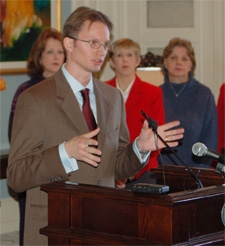 After discussion and collaboration, the NBCT Summit's recommendations were released to the public today at an OEA sponsored press conference.
After discussion and collaboration, the NBCT Summit's recommendations were released to the public today at an OEA sponsored press conference.These recommendations don't come from "think tanks" or outside school sources. They come from the classroom teachers and administrators of Oklahoma.
At the press conference, the report was dedicated to Mr. John Rex of Oklahoma City. John was a tireless advocate for children, public schools and the National Board process. John passed away shortly after the NBCT summit, but his memory will live forever in the hearts and minds of all the students and teachers who benefited from his commitment.
During the conference, Senator Paddack, Representative Coody and Superintendent Garrett spoke about supporting the recommendations of the Summit. Speaking for the National Board Certified Teachers at the Summit was Kevin McDonald, a high-school English teacher from Edmond. Kevin talked about how the NBCT process works and how the recommendations would make a difference for children and teachers across our state.
The recommendations include special training and additional professional development, including offering teachers in high-needs schools five additional days to work on teaching practices needed to teach a diverse population. Teachers in high-needs schools also need additional time to collaborate and build connections with their peers and to meet these demands.
Growing your own NBCT's should be priority for high-needs schools. Recent data indicates the most effective method for increasing National Board certification is through a local support network of teachers and administrators within the district and at the candidate's school site.
Salary incentives are not the only answer, but are necessary to recruit and retain highly qualified teachers to the high-needs schools. Money alone is not enough to keep them in theses schools, which is why we need to offer non-financial related incentives as well. Lower class sizes, improving building infrastructure to ensure the classrooms are properly heated and cooled, and the necessary resources to teach students must be addressed.
And finally, we need to align the various education programs throughout the state. Colleges and universities can align mentoring efforts with the skills necessary to be Board certified within their master's degree programs.

No comments:
Post a Comment